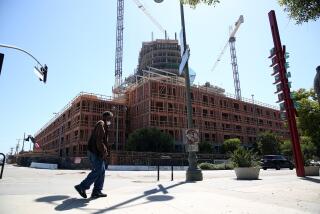Rise in housing starts belies grim market
- Share via
WASHINGTON — Groundbreaking for U.S. housing rebounded in October but permits for future building hit a 14-year low, indicating the grim market for home construction is likely to continue to worsen.
The Commerce Department said Tuesday that housing starts rose 3% to an annual pace of 1.229 million units in October. The increase, which followed an 11% plunge in September, reflected a bounceback in groundbreaking for multifamily dwellings and failed to convince economists that things are improving in the housing sector.
“The bottom line is that the modest October increase in housing starts is likely to be a brief interlude in the ongoing downtrend in construction activity,” said Stephen Stanley, economist at RBS Greenwich Capital.
Groundbreaking for single-family homes, the biggest category of home building, fell 8% to the lowest rate in 16 years.
“The housing market is flat on its back,” said Joel Naroff, chief economist of Naroff Economic Advisors in Holland, Pa. “Only a sharp increase in multifamily activity kept starts from falling again and that segment of the market is not going to lead us out of the slump.”
Building permits, an indication of future activity, fell 6.6% in October to a 1.178-million-unit pace. That was the lowest level since July 1993 and below the 1.2-million-unit level economists were expecting.
For the 12-month period ended in October, housing starts were down 16.4%. Permits were down 24.5%.
“We have not hit a bottom [in housing]. We need to see starts fall to a 1-million-unit rate, or roughly a 20% drop from current levels, before building activities stabilize. And we need to see that rate for about one to two years,” said Keith Hembre, chief economist at FAF Advisors Inc. in Minneapolis.
Adding to the dire housing outlook, D.R. Horton Inc., the largest U.S. home builder, on Tuesday reported a quarterly loss after taking charges for the lower value of land and other housing-related inventory.
The charges were significantly below what some analysts had expected.
More to Read
Inside the business of entertainment
The Wide Shot brings you news, analysis and insights on everything from streaming wars to production — and what it all means for the future.
You may occasionally receive promotional content from the Los Angeles Times.










